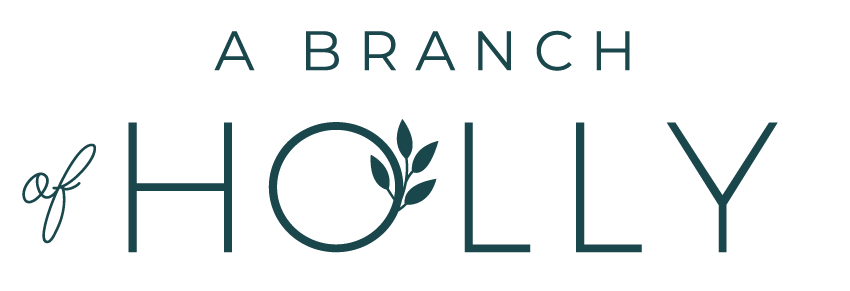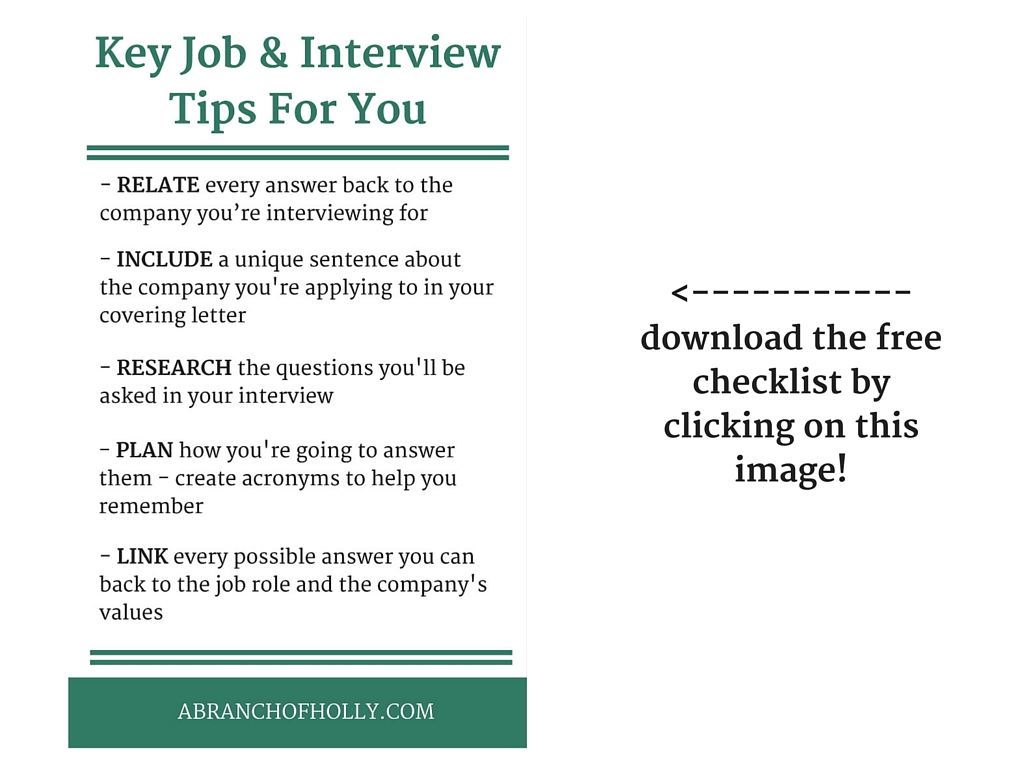The Only Interview Tip You'll Ever Need To Get The Job
When you ask for help or read articles on interview advice, you’ll be told lots of things:
- Know your CV inside out
- Prepare and practice your answers
- Stay calm
- Keep eye contact
- Ask questions
These are all awesome and will help you to have a killer interview.
But isn’t there something that will make you stand out more? Isn’t there something you can do to beat the competition and put you in the lead?
If you had to narrow all the tips down to the most important one, what would it be?
Enter the point of this blog post - the only interview tip you’ll ever need
This will help you get the job. Fact. Just read on to find out the answer.
Oh, and there’s a bonus checklist that you can get for free with extra tips!
You can download it for free by clicking on the image or clicking right here.
How do I know this works? Well friends, I’ve had five major interviews over the past year, and I got every job using this tip.
This will set you apart, I promise. Are you ready for it?
Relate every answer back to the company you’re interviewing for.
Let me explain.
Why Does This Matter?
Interviews are one of the only opportunities you get to talk openly about yourself and your achievements without feeling big-headed. But – finding out about you is only half of it.
The other half is your employer trying to figure out if you’re going to fit into the company and if you want the job enough.
Let’s relate it to your covering letter.
If you send out the same generic covering letter to everyone, they’ll see there’s no originality and you probably won’t be asked to an interview.
But if you include something in each letter that says, “I believe [insert company name here] is an [enter description]. I am particularly impressed with your ability to [insert description]."
Here’s an example from one of my covering letters.
I am an avid reader of [insert company name] and believe it is a leading brand that is the first destination in helping women to decide what is the right style, the right colour and above all, the right look. I am particularly interested in the brand's ability to create such timely, interesting and high-quality features over a range of lifestyle topics.
That right there is how you make yourself unique. That’s how you make yourself stand out.
It’s exactly the same principle for this tip. Talking about all your achievements and skills in your interview is great. But if you can relate those directly back to the company you want to work for, you’ll stand out so much more compared to the other candidates.
So How Do I Do It?
It’s all in the planning. Forming an answer for each question lets you prepare this in advance. You can plan your general answer to the question and at the end, relate it straight back to the company.
Ultimately, every single company wants to hire someone who will benefit them. They won’t let personal issues come into it. If you can show you know the company, you’ll definitely tick a box.
But I know what you’re thinking:
How do I know what questions I’ll be asked?
You’d think that would put a spanner in the works - but it’s actually not as big of a problem as you think.
You see, usually, you can predict the questions you’re going to be asked.
Let’s use one of my interviews as an example. Last November, I went for an interview for an “SEO Content Writer”. I knew that there was a 99.9% chance I was going to be asked something along the lines of:
Can you tell me about your understanding of SEO?
And what would you know? They asked me that exact question.
Luckily, I’d prepared an answer of my understanding of SEO, using an acronym to help me remember it.
(For those of you who are slightly interested or might have a question like this in the future, my acronym was K-CLUB - keywords, content, links, usability and branding. Cool, right? ;) )
You see, you’ll get asked the same questions in almost every interview:
Tell me about yourself
What are your biggest achievements?
Tell me about a challenging moment and how you overcame it
Where do you see yourself in five years?
You can prepare the answer for all these questions. And you can also plan how to relate it back to the company.
Take the “tell me about yourself” question. There’s a set formula I use for answering this question.
Start with what your current job is
Three of your strengths
Next, your biggest achievement
What you believe you are - (e.g. self-starter, motivator etc.)
Why you’re applying for this role.
It’s easier than it sounds.
For the last part, you can say, “I’m now ready to take on a new challenge in a company that holds the same high standards and expectations as I hold for myself.”
Boom. You’ve just related what you’ve said directly back to the company. One box is ticked already.
It’s that simple. The sooner you plan one answer, the rest will come more easily.
As for other questions, they all depend on the role you’re applying for and the industry you work in.
If you’re applying for a job with leadership qualities, you’re bound to be asked to describe a time when you took on a leadership role.
If you work in the creative industry, you’re bound to be asked to bring in a portfolio and talk about your favourite piece of work.
If you’re applying for a job that includes analytical skills, you’re bound to be asked to describe a situation where you had to use these skills.
You see? You can do it.
How Do I Do It For Each Specific Question?
This is where it gets harder. For those difficult questions that make your palms sweat and your face go red. Where you’ve got to think on the spot and it could be make or break right here.
It’s actually quite surprising what your mind can do if you really want something.
For the job I’m in now (Marketing Coordinator), I researched loads of questions for the interview. One I came across was this:
Can you tell me about a marketing campaign that has inspired you?
Cue sheer panic and oh my god, I’m never going to get this job.
That’s a hard question, right? I mean, if I’d have just been asked that on the spot, I don’t know if I’d have been able to answer it.
So I told my mum and we started talking about marketing campaigns.
I described a Dove campaign I really liked called “Choose Beautiful.” It calls for all women to ignore the media’s stereotypical, unattainable standards of beauty and instead, choose to embrace female empowerment.
Women could choose to walk through two doors - either one labelled “average” or one labelled “beautiful”. Many women walked through the door labelled “beautiful.” Those who walked through the door labelled “average” were then asked why they didn’t walk through the “beautiful” door - but then walked back out and went through that door.
My mum asked me what that meant to me. I said it’s there to show that every woman is beautiful. No matter what size they are, what skin colour they are or whether they’re confident or shy - it’s there to celebrate that every woman is equal but also special.
And then I had a lightbulb moment.
I knew the main marketing campaign for the business I was applying to work for. It was based around the hashtag #WeAre, #IAm, #YouAre - so if we were taking Dove as the example brand, it would be We Are Dove, I Am Dove, You Are Dove. It’s a fantastic marketing campaign - and one I realised related directly to Dove’s campaign.
The company’s campaign was also there to say, it doesn’t matter who you are, where you’re from or what you’re into - in our community, everyone is unique.
I was asked that question in my interview - and that’s exactly how I answered it.
How Does This Help Me?
Think about what the company is about. What are its values? What does it believe in? Does it have a mission statement? These are all things you can relate your answers back to. If the company believes in transparency, you can tailor the answer to your question to transparency and link it right back to the company.
For instance, what are your biggest strengths? Your transparency - and there’s your answer.
Make a list of the skills they’ll be looking for and how you can incorporate these into your answers. Don’t say your biggest strengths are A, B and C if they’re not related to the skills the company wants - they’ve got to be tailored specifically. This way, you’ll be relating your answers to the company without even realising it.
There’s lots of great interview tips out there. But this is the most important one. If you do this, you’ll tick every single box.
Have you tried this tip before? If you’re preparing for an interview, will you try this out? Let me know if you’ve got any other secret tips in the comments!




